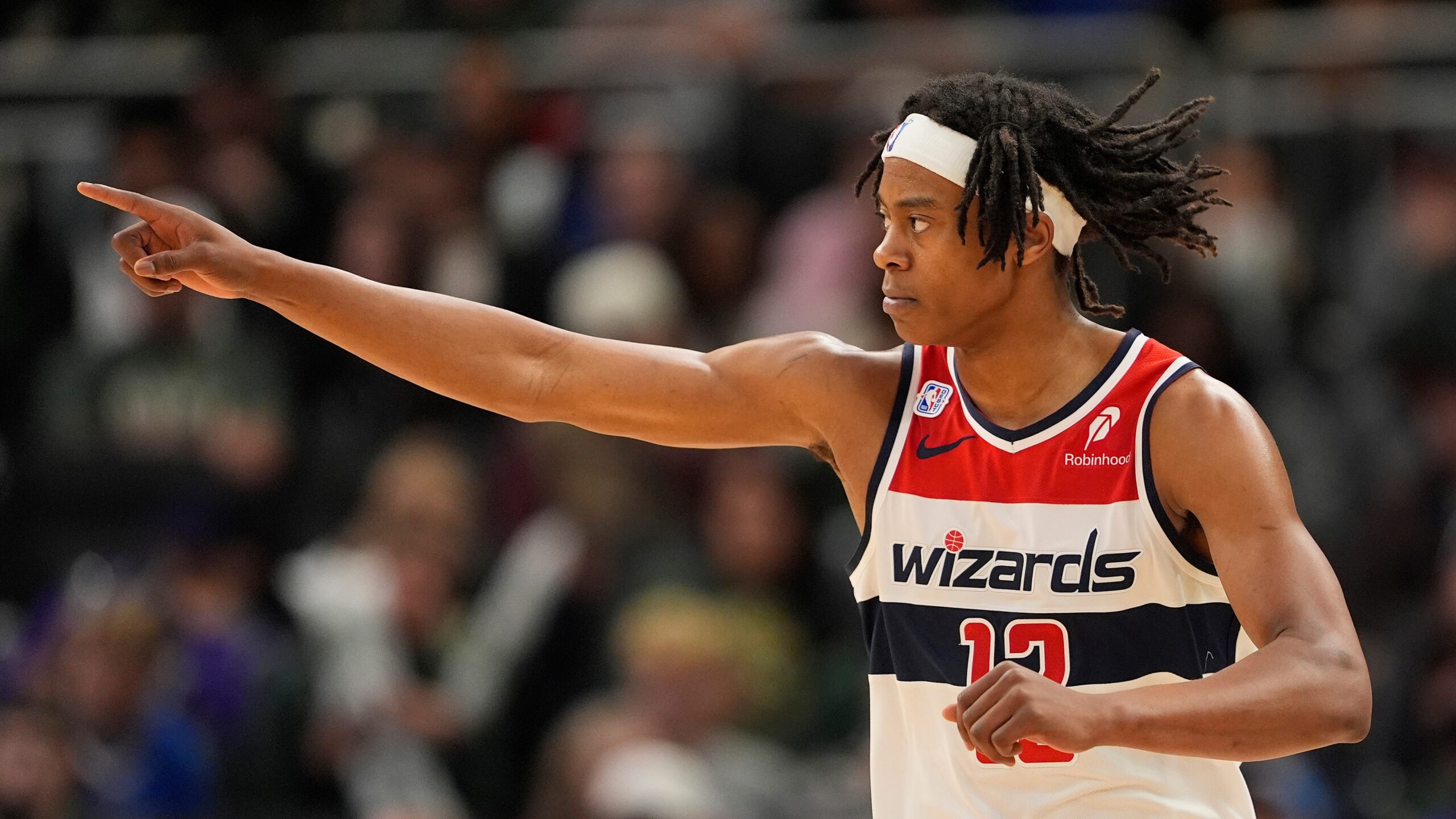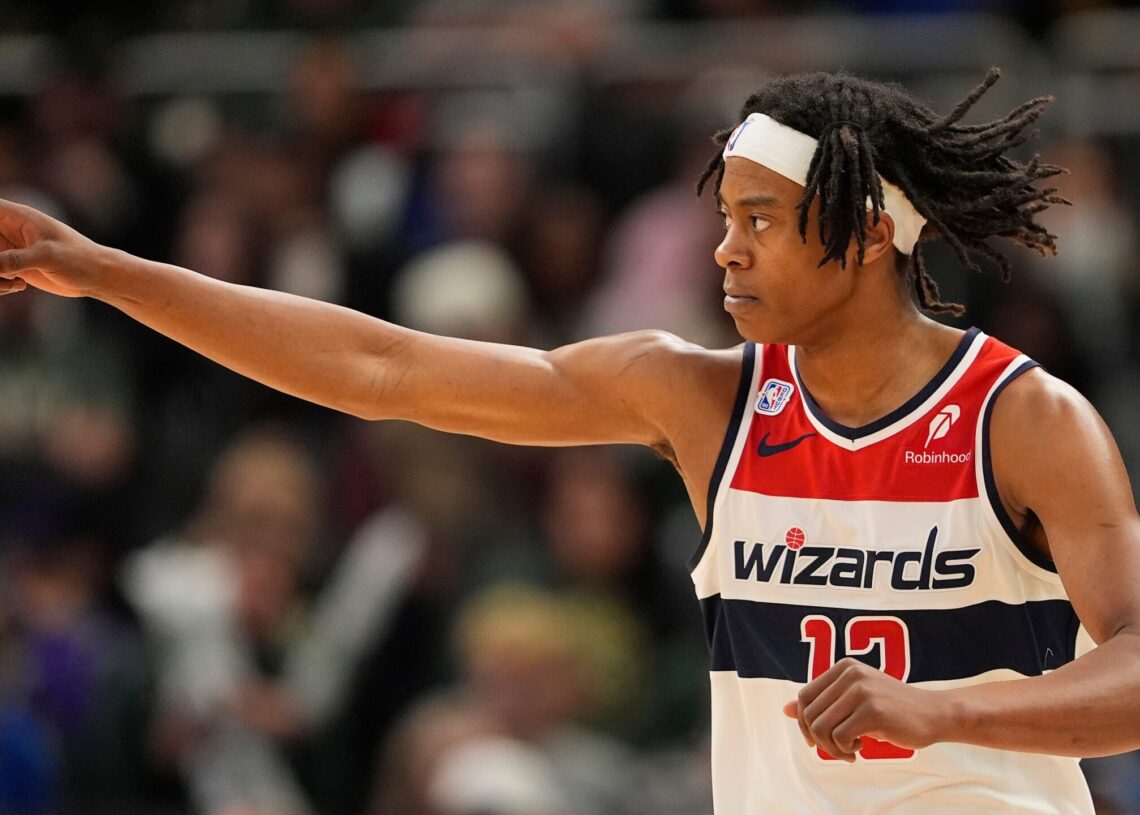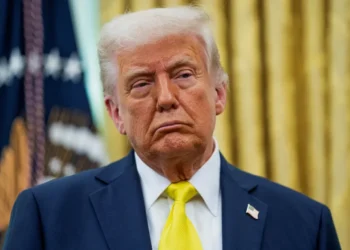
Tre Johnson hears a voice when he plays basketball. It’s his own. He won’t reveal what he says but does mention the self-talk is exclusively negative. Johnson picks at himself, always looking for more — even if he is playing well.
At times, Johnson hears his voice differently. It echoes of his father’s. He heard Richard Johnson Jr.’s gravelly tone all the time growing up, often cutting through crowded gyms and empty blacktops.
Tre Johnson hears a voice when he plays basketball. It’s his own. He won’t reveal what he says but does mention the self-talk is exclusively negative. Johnson picks at himself, always looking for more — even if he is playing well.
At times, Johnson hears his voice differently. It echoes of his father’s. He heard Richard Johnson Jr.’s gravelly tone all the time growing up, often cutting through crowded gyms and empty blacktops.
“Growing up, there was not too much positivity. … I never asked [my dad] why,” Johnson said. “But I always thought [it was] just so I never got complacent. … I feel like I’m never talking to myself in a positive way.”
That internal critic is a remnant of a father-son relationship that was at times turbulent. Richard Johnson intentionally made himself Tre’s coach, believing he could best develop his son. It worked.
Johnson built a furious work ethic. At 19, the Texas guard was selected sixth overall by the Washington Wizards in the 2025 draft and could become a premier scorer in the NBA. Through 12 games as a rookie, he’s averaging 11.9 points a night.
But Richard’s dual-role strained his relationship with Tre. Their bond has been rekindled in recent years, in large part because Richard stepped back as coach.
Richard had never heard Johnson link the negative self-talk to his voice. It gave him mixed feelings. He liked that Tre knew his dad was always right there with him. But part of him felt weird.
“I don’t want it to hinder him or hold him back. I don’t want it to be too hard on him,” Richard said. “I don’t want him beating himself up.”
In Texas, you better finish your workouts early. Wait too long, especially as spring makes way for summer, and the sun will sit high and bake you. That’s especially true on the Couch Elementary School basketball court, a slab of concrete in the Dallas suburbs with little shade.
Tre still remembers the heat.
When Tre was in the eighth grade, the world shut down for the coronavirus pandemic. Across the region, basketball hoops were taken down to dissuade people from gathering. But they stayed up at Couch, a short ride from the Johnson’s home in Garland.
Most of the time, the Johnsons would start early or late to avoid the heat — but not always. Days began on a modest, extended incline along their street. Richard made his sons run, backpedal and defensive shuffle up the hill. They rested on the walk back down.
They biked to Couch. Neither hoop had a net, so Richard brought his own. There, they spent nearly two hours a day doing basketball drills and workouts, which included bear crawls, jumping exercises and burpees.
Richard wielded the exercises as penalties if he felt Johnson was just going through the motions.
Tre considers that time a pivot point in his basketball journey. He would have still gotten here without it, he said, but it would have taken longer. The pandemic gave him a chance to close the gap with others in his class — or create one of his own. His favorite memories are the hardest moments.
“All the non-fun times, I’d say. All of the burpees, all the running. … I feel like that just helped me,” he said. “Mentally, I feel like I changed as a person after covid. I took basketball more seriously.”
Richard celebrated his sons’ successes on the court, taking videos and sending them to his wife, Priscilla. His willingness to be Tre’s biggest fan also allowed him to be his biggest critic, he explained.
Richard’s pinpoint memory made him prolific at both. He coached Johnson in basketball, soccer and football since age 5, and the two began reviewing game film when Johnson was in second grade.
Richard continued coaching Tre in high school, becoming the assistant under Joe Duffield at Lake Highlands.
In Tre’s sophomore year, he readied for a matchup against senior and future NBA first-round pick Cason Wallace. The day before the game, he and Richard worked out, and as Duffield put it, Richard was “poking the bear a little bit.”
Richard felt as if he was just giving Tre pointers. Tre felt as if his dad was giving Wallace too much credit. Upset, the guard left the workout early.
“I just wanted to prove my dad wrong … about Cason’s defense and Cason being all this and all that,” he said.
After a slow start, Tre knew he had to “take over” for his team to have a chance. He scored 37 points in a narrow loss.
A year later, Johnson and Lake Highlands rampaged through the 6A playoffs, Texas’s largest classification.
The Wildcats watched other title games played before playing theirs in the Alamodome in San Antonio. Shortly before tip-off, Tre talked to his team.
“At the end of today’s game, he said, both teams will line up. One side will be crying. Another will be celebrating. Pick what side you want to be on,” he said.
The Wildcats trailed by four entering the second half. Then, Johnson picked his side. A personal 9-0 run — he finished with 29 of his team’s 55 points — led Lake Highlands to a state championship.
“He got back into Tre’s mode … started seeing the ball go in. Then he starts talking to himself,” Richard said. “And it was over with after that.”
That game was the last time Richard formally coached Tre, a chapter in their life that ended with a medal around Johnson’s neck and with a father placing an imaginary crown on his son’s head.
At one point, Richard Johnson had NBA ambitions himself.
But his father, a boxer who also played basketball, didn’t have the knowledge of the game to properly help him. Richard grew up playing center despite topping out at nearly 6-foot-3. He became a slashing guard, playing at Baylor before transferring to Midwestern State, a Division II program in North Texas. He briefly played professionally in Mexico.
He told himself that when he had kids, he would teach them to handle the ball and shoot.
Richard wanted to create an environment that pushed Tre. Nobody else would make it easy for his son — best to prepare him early.
“My goal was to prove my coach wrong,” Richard said. “That’s how Tre is. … His mission is to go out and prove dad wrong.”
There’s that blending of worlds again, a merger that caused Richard and his son to butt heads. Would the father change anything?
“If I could go back and do it,” he said, “I would do it the same way probably all over again.”
A week later, he led a reporter to the Couch Elementary court and, unprompted, said he would change things but didn’t specify what.
Tre’s mother, Priscilla Johnson, has her own misgivings. She paused for a moment as she searched for the right word to describe her son’s negative self-talk.
She settled on “heartbreaking.”
“I hate that for [Tre], that he feels like he has to talk negative to himself,” she said.
Richard’s voice is usually the loudest in the gym, she said, adding that her husband would compliment and critique in equal parts.
“Sometimes people can only discern the negative part of it,” she said.
Priscilla’s only interest in basketball stems from her kids. Richard tasked her with filming Tre’s games when he was younger — except she would get so excited the camera wouldn’t always follow the action.
There are moments when Priscilla wished she had spoken up, particularly to quiet those car rides. Everyone is on a high or a low after a game, she said, and the increased emotions could make for an intense conversation — never about Tre’s grades or behavior, both of which were excellent, just about basketball — in front of her and Tre’s younger brother, Eli.
“He’s always been a coach so he’s always had to be stern, basically,” Priscilla said about her husband. “ And so sometimes I feel like sometimes he can’t separate that from fatherhood and coaching.”
She felt that her husband and son would have a strained relationship as Tre aged. It turned out to be the opposite.
Richard acknowledged he said or did things that could have damaged his relationship with Tre. He had pushed his son in many of the same ways his father pushed him.
But Richard pointed to a key difference. His father would let those challenging moments sit, leaving Richard with unanswered questions and unresolved tension.
As a father, Richard always tried to clarify his actions with Tre, explaining his reasoning and smoothing over any disputes from the day.
He would always end the message with three words: “I love you.”
Tre left home for his senior year of high school, transferring to Link Academy, a basketball-focused boarding school in Branson, Missouri.
That was the hardest time for Richard, who now had to trust that somebody else would guide his son. He didn’t need to worry — Tre kept up the work ethic in Missouri, Austin, and now in D.C.
“I gave myself a pat on the back for that,” Richard said.
Tyler Relph, a trainer who has known Tre since middle school, helped prepare him for his predraft workouts. Even as the guard jet-setted between teams, he never wanted to stop working. Relph tried to dissuade him — without much luck.
That’s been a common experience among those who have worked with Johnson. Frank Haith, a former assistant coach at Texas, said Tre was the first player he ever had to tell “that’s good enough for today.”
After a Wizards training camp practice, veteran CJ McCollum said the team — in an effort to keep everyone fresh — told players not to shoot after practice ended.
“People supposed to go home, and look, he’s going to shoot now,” he said, pointing at Johnson.
A few moments later, Washington assistant David Vanterpool shouted at Johnson: “No, no, no! Go home!”
The physical distance between father and son did more than show Johnson’s solo work ethic. It also helped Tre’s relationship with his father, both acknowledged. Richard took a conscious step back. With them no longer in the same house, he couldn’t as easily clarify something, he explained.
And their relationship needed to be tight, because Richard wanted to be the person Johnson called when things went wrong or he needed advice.
“You’re seven hours away from me. We got to be the best of friends,” Richard said.
After Washington’s preseason finale, when Tre made just 1 of 8 shots, Richard texted him. Tre called and they talked, with Richard letting his son vent and telling him what he saw. Richard acknowledged that with Tre being a young adult, he could no longer be the “overbearing dad.” Richard said he had to adjust and even grow up. He’s glad father and son found the need and ability to change their outlooks and roles toward each other.
These days, Richard is now playing just one role: Dad.
“It’s a lot easier,” he said.
When Adam Silver called Johnson’s name at the NBA draft in June, the guard leaped up. He started the celebration by dapping up his father and pulling him in for a hug.
“Man, you got up fast,” Richard whispered in his son’s ear, noticing his son’s delight at being picked by the Wizards. Duffield said Johnson wanted to play for either Washington or the Brooklyn Nets, seeing both opportunities as a chance to build a franchise from the ground up.
As Johnson and his father separated, the two flashed identical open-mouth smiles at each other. When the guard walked off the stage and toward an ESPN interview, his father stood beside him.
“This was my dream 20 years ago — I mean 30 years ago,” Richard said. “I’d rather for him be here than me anyways.”
Johnson started his response by needling his father — “he tried to lie on his age,” — but closed by giving him credit on the night a multigenerational dream came true.
“He’s been there the whole way,” Johnson said. “It’s like we both getting drafted right now.”
The post The one defender Tre Johnson could never shake was his dad
appeared first on Washington Post.




